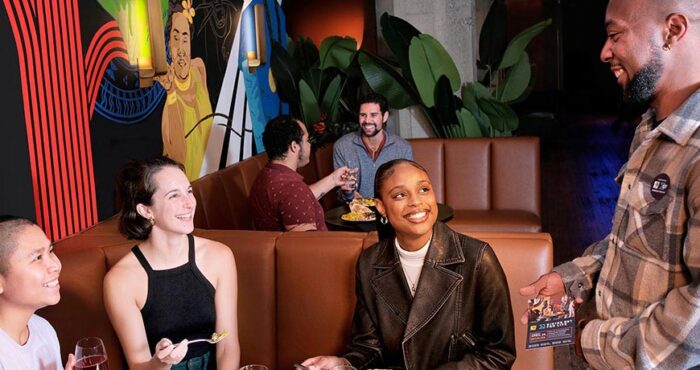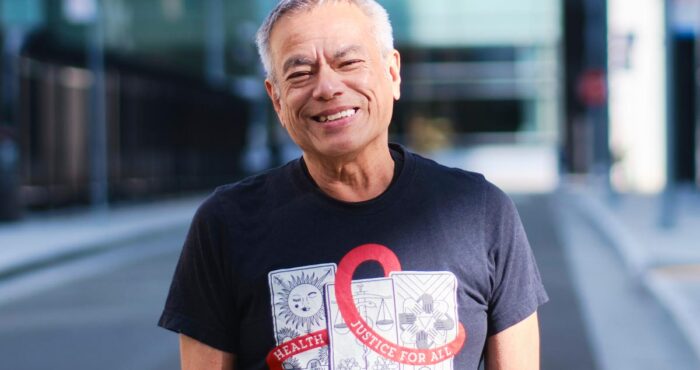Event cancellations, site closures and orders to practice social distancing in response to the coronavirus outbreak are leaving many of us without the usual ways to socialize and stay connected. Many of us rely on community events, clubs and regular group meetings for social support and community connection, and we’re finding that isolating at home can be distressing–not to mention disruptive to our mental and physical health.
For our staff in charge of community engagement and events, their creativity is tested as they find ways to support group members virtually, preventing loneliness in this unprecedented time of coronavirus.
“As part of the Elizabeth Taylor 50-Plus Network, everything we do is around being together and doing activities face-to-face,” said Dusty Araujo, health educator for 50-Plus. “We realized right away that this was going to have an impact on our group, so right now we’re working on a plan to call some of our group members to check-in and see how they’re doing.”
Mayia Ogbebor, manager of community health programs, is also making sure her teams are able to reach group members over the phone to provide support and answer questions during this time.
“For group members that may be feeling depressed or lonely, we have a counselor they can speak to. If people are concerned about their substance use, we can connect people to counselors from the Stonewall Project. There’s a lot of support available, we just want to make sure people know that,” she said.
Members of Black Brothers Esteem (BBE)–a close-knit group used to seeing each other at regular weekly events–are finding innovative ways to stay busy and connected. Staff members are reaching out to group members individually, and are available for clients to call them. Preston Vargas, PhD, CADC-CAS, BBE coordinator, said that members requested materials to create panels for the AIDS Memorial Quilt while they’re hunkered down at home.
“We had already bought the materials and were planning a quilting event when the coronavirus outbreak began,” said Vargas. “But some of the members said, ‘Hey, if you can get us the materials, we can still quilt at home.’ It gives them an opportunity to stay busy, and talk and think about the folks they still remember and love.”
A few SFAF groups are also planning virtual group events such as discussions and learning events and virtual book club meetings. BBE is planning to hold its weekly game night by hosting a virtual “Family Feud” style game where players can connect by phone or through their TV, and is switching the book club to an audio listening event where members can tune in at the same time to hear book chapters read aloud.
Personally, Araujo said he’s been keeping in touch with family members and friends–here in the Bay Area but also abroad–on a near-daily basis.
“It’s such a strange time. Check-in and see how the people in your life are coping. Don’t be afraid to reach out if you’re struggling,” said Araujo. “This is a great time to tackle projects that you’ve been meaning to make time for. I’ve had several books lying around that I haven’t finished, so I’m going to use some of my time in isolation to finish those. It’s also important to keep doing things that lift your spirits–listen to upbeat music, get out of your pajamas, take a shower every day. Those things are refreshing.”
Vargas said that this is the time to say hello and try to get to know your neighbors. “You don’t have to get too close–but say hello to people you do still see. One of the things I loved growing up in an urban area was that we could sit on our porches, or lean out or windows in the summer, and just talk to people across the alleyway. It’s wonderful to get that human interaction and also see people still living and going on about their daily life.”
Public health officials are advising people to stay six feet away from others to prevent transmission of COVID-19, but as Vargas, Araujo, and Ogbebor demonstrate, there’s still a way to stay connected.
Resources
Open programs and services
We have a number of essential health programs and services currently operating. For more info, visit sfaf.org/COVID-19.
Coronavirus resources
To provide information about COVID-19 in San Francisco, the San Francisco Department of Public Health is maintaining a Cornonavirus Fact Page and an FAQ on Novel Coronavirus (COVID-19).
The San Francisco Department of Emergency Management is providing updated information at sf72.org.
University of California San Francisco is maintaining a COVID-19 resources page with links to patient resources and clinical guidance.
The Getting to Zero San Francisco coalition is issuing regular statements with tips to lower risk.









